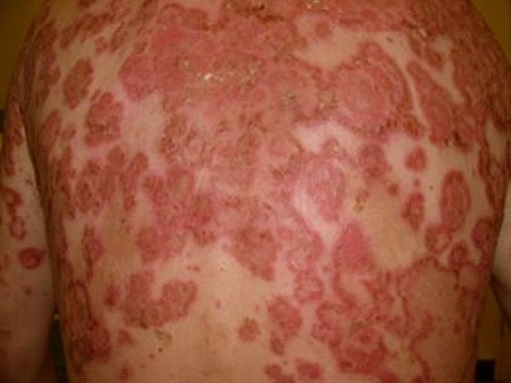Pemphigus Symptoms, Causes, Diagnosis and Treatment

What Is Pemphigus?
The disease Pemphigus is a set of unusual skin diseases which cause sores of your mucous membranes or skin, for instance on your genitals or in your mouth.
There’re two major kinds of pemphigus: Pemphigus foliaceus and Pemphigus vulgaris. However, the most usual form is Pemphigus vulgaris.
Pemphigus is able to happen at any age, however frequently attacks individuals who are older or in middle age.
Generally a chronic disorder, pemphigus is controlled best with the timely treatment and diagnosis, that might contain treatments or medications like those utilize for serious burns.
What Are The Symptoms Of Pemphigus Vulgaris?
Pemphigus possibly will happen for a large or small piece of the skin. The most common symptoms are Pain and Itching. Different symptoms will fluctuate along with the kind of pemphigus:
Pemphigus possibly will cause:
- The injury which might spread deep into your skin.
- Blisters which generally begin on the scalp or in the mouth.
- Lesions which headway to the upper body, armpits, neck, groin and face.
- Blisters that might seem in the nose, throat, rectum, esophagus, larynx, rectum, vulva or eyes.
- Painful, vulnerable sores.
- Red skin.
- Blisters which might magnify into the nearby tissue while there is an addition of pressure.
- An exterior skin layer to be rubbed off simply.
- Soft and simply broken blisters which discharge fluid.
- Big parts of the open skin, raising the possibility of fluid infection and imbalance.
- Blisters which generally heal without marking, but possibly will change the color of skin to brown.
What Causes Pemphigus?
This particular disease is an autoimmune condition, and, in general, it is unidentified what causes the illness.
Generally, foreign invaders become the victim of your immune system, for instance, bacteria and harmful viruses. However in pemphigus, your immune system erroneously creates antibodies which attack your skin and mucous membranes healthy cells.
At times, pemphigus develops as a side effect of certain medications, such as certain blood pressure drugs or chelating agents. This type of pemphigus usually disappears when the medicine is stopped.
What Are The Risk Factors Of Pemphigus?
Pemphigus is not spreadable, and there is no manner to forecast who will be its victim. On the other hand, if you are older or middle-aged your risk rises.
How Pemphigus Is Diagnosed?
The doctor might query regarding your medical history and symptoms. Your doctor will perform a physical examination. This probably contains a full skin test. Special caution is offered for testing the lesions.
Assessments to search for symptoms of an autoimmune condition possibly will contain:
- Skin and Blood tests.
- Skin biopsies of the surrounding tissue and lesion.
How Pemphigus Is Treated?
Treatment that targets at decreasing symptoms and signs and stopping problems is usually more efficient while it initiates as early as probable. The treatment contains medicines, and at times, hospitalization. Medicines possibly will be used only or in mixture with different for the treatment of pemphigus.
- Corticosteroids. The support of cure is generally corticosteroids, for example, prednisone. Though, consuming corticosteroids in high doses or for a long time possibly will cause severe side effects.
- Immunosuppressants. These medicines, for instance, mycophenolate mofetil (CellCept), methotrexate (Trexall) or azathioprine (Imuran), assist in keep your immune system not to attack on healthy tissue.
Related Articles :
Pitted Acne Scars Symptoms, Causes, Diagnosis and Treatment
Acne Rosacea Symptoms, Causes, Diagnosis and Treatment
Acne Vulgaris Symptoms, Causes, Diagnosis and Treatment
Erythema Nodosum Symptoms, Causes, Diagnosis and Treatment
Vitiligo Symptoms, Causes, Diagnosis and Treatment
Psoriasis Symptoms, Causes, Diagnosis and Treatment
Gangrene Symptoms, Causes, Diagnosis and Treatment
Chickenpox Symptoms, Causes, Diagnosis and Treatment
Aspergillosis Causes, Symptoms, Diagnosis and Treatment
By : Natural Health News




